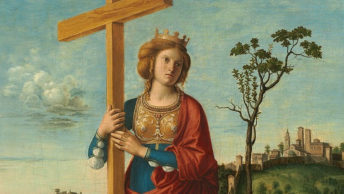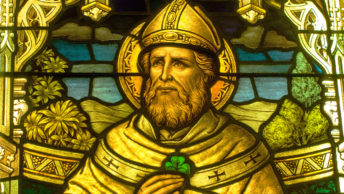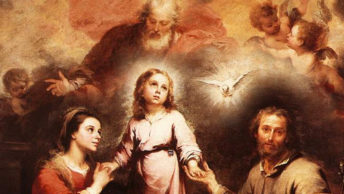A very wise and intelligent Jewish university professor and scripture scholar [Pinchas Lapide] once wrote a book about the meaning of Easter Sunday. Though he himself was a devout, Orthodox Jew, he had great sympathy and admiration for Catholicism; for instance, he publicly credited Pope Pius XII and the Catholic Church with saving well over 800,000 Jewish lives during the Nazi holocaust of World War II. In his book The Resurrection of Jesus: A Jewish Perspective, this Jewish scholar came to a surprising conclusion for a non-Christian. He wrote that, based on the evidence, he had to admit that Christ’s Resurrection actually occurred, and that it was indeed a real historical event. After all, he reasoned, there was no other way to explain the incredible rise of the Church and the spread of Christianity, and the transformation of frightened apostles into bold religious leaders willing to undergo imprisonment, persecution, and even death. Having reached this conclusion, however, the professor didn’t take the next logical step of concluding that all this means the Gospel must be true and valid for everyone. He wrote instead that the Resurrection of Jesus didn’t prove He was the Messiah or the Son of God, as He claimed. Rather, said the Jewish scholar, Jesus rose from the dead to save only the Gentiles, or non-Jews; Jews didn’t need him because they were already saved by being descendants of Abraham (Virgil Hurley, Speaker’s Sourcebook of New Illustrations, p. 239). This is a wonderful illustration of an honest, intelligent scholar carefully using human reason to arrive at a mistaken conclusion. He was able to look objectively at the evidence and understand what it meant, but he didn’t quite have the courage or desire to accept its full implications. Human reason is capable of figuring out many things, but on its own, it falls short; we need God’s help if we are to arrive at the truth that saves—and Jesus promises that this truth will be made available to those who genuinely seek it.
The word “truth” can be used to sum up the celebration of the Most Holy Trinity: not only in terms of the Church’s teaching that there are Three Persons in One God—a solemnly defined truth every Catholic must accept—but also in terms of how God relates to His creation. God the Father is perfect in every way; there is no shadow of deception or contradiction in Him, and He cannot lie to us or mislead us. Jesus Christ, the Second Person of the Holy Trinity, described Himself as “the Way, the Truth, and the Life;” only through Him can any of us hope to be saved. The Holy Spirit helps us understand and live out this relationship in a personal way; as Jesus said in the Gospel, “the Spirit ofTruth will guide you to all truth.” It is only through the power of the Holy Spirit that we are capable of discovering and living by God’s saving truth. The Book of Proverbs speaks of the wisdom of God which orders all things toward life and truth, and in the Letter to the Romans, St. Paul rejoices in the love of God, expressed for us in the saving death of Jesus and poured out into our hearts through the Holy Spirit. This is the truth of our Catholic Faith, and it must also be the truth by which we arrange our lives.
Blaise Pascal was a great scientist and mathematician in early 17th century France; he was also a devout Catholic who firmly believed that while human reason is very important, a trusting faith in God is even more important. He once wrote, “We arrive at the truth, not by reason only, but also by the heart” (Anthony P. Castle, Quotes & Anecdotes, p. 139). This is how we are called to make sense of, and respond to, the Church’s teaching on the Holy Trinity. Human reason alone would never have come up with the idea of Three Persons in One God. Looking at the beauty and complexity of human life and the world around us, we would quite naturally conclude that there must be a Supreme Being Who created everything that exists—but we’d never imagine that this God is actually a Trinity of Three Divine Persons. This truth can only be known because God Himself revealed it to us—and the purpose of such a self-revelation on God’s part is for us to make a threefold response of love and wonder and trust.
God the Father is good and loving, and everything He created—ourselves included—is an expression of His goodness. Because of original sin and the misuse of our free will, we were alienated from God, and so Jesus came to save us. This is the meaning of His death and Resurrection. This truth, however, is not a mere historical event; it’s supposed to have a personal effect in our own lives. It’s the role of the Holy Spirit to make this happen, through the spiritual gifts and inspirations and guidance we receive.
Is it easy for us to live out our faith, to grow in holiness, and even to become saints, in today’s world? No—but God our Creator makes it possible, Jesus our Savior shows us how, and the Holy Spirit our Sanctifier gives us the strength and grace we need to respond in obedient faith. Just as the mathematical equation 1 times 1 times 1 equals 1 expresses a dynamic reality, so the presence of the Holy Trinity in our lives is intended to help us live a threefold life of faith, hope, and love—a life involving God, other people, and ourselves, a life encompassing our past, our present, and our future.
Three is a holy number, a magical number, and a life-giving number—and those who in their search for God or for truth or for meaning in life are only willing to take the first or second step are going to fall short. We pray for all those who do not believe in the Holy Trinity, and we have every reason to hope that if they are sincerely trying to be good persons, God will somehow include them in His Kingdom—but the fullness of truth and spiritual life must include a belief in God the Father, the Son, and the Holy Spirit.
The reality of the Holy Trinity is an astounding concept, a joyful mystery, and a life- giving reality. We don’t need to be able to understand or explain this idea in theological terms; all that God asks is for us to live in a spirit of faith, hope, and love—and Our Lord promises that if we make this effort, His Spirit will fill us with the truth that leads to eternal life.








